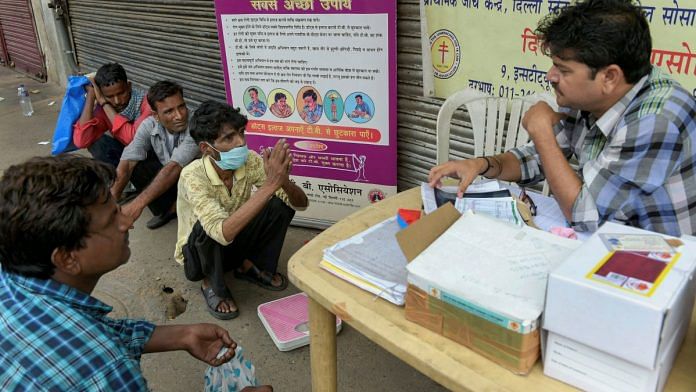New Delhi: The Covid-19 pandemic has severely impacted reporting of tuberculosis cases in India, with the lockdown, deployment of staff on Covid duties, and lack of access to healthcare all playing a role in this dip in the numbers.
Many state governments are now trying to overcome the hurdle by conducting TB tests on patients who have reported either severe acute respiratory infection (SARI) or influenza-like illness (ILI) but tested negative for coronavirus.
Both SARI and ILI are associated with Covid-19 but can also be symptoms of other diseases.
Uttar Pradesh has written to all district TB officials to initiate testing of such patients, while Karnataka and Gujarat have already started it.
TB reporting, according to public data on the government’s Nikshay portal, has gone down by 30 per cent during the pandemic, as compared to last year.
Between 1 January and 17 August 2019, a total of 15,59,000 TB cases were reported, of which 4,42,326 were from the private sector (hospitals, clinics, etc). In the same period this year, as many as 10,79,513 cases have been reported, of which 3,00,871 are from the private sector.
Known to be highly contagious, TB is a notifiable disease by law and not notifying a case to the government can have serious penal consequences for doctors.
According to the National Strategic Plan for Tuberculosis Elimination, a government programme that aims to eliminate the disease in India by 2025, TB kills an estimated 4.8 lakh Indians every year or more than 1,400 every day.
According to guidelines laid down by the Indian Council of Medical Research (ICMR), all ILI patients with a history of national or international travel, or contact with a positive case, have to be tested for Covid-19. All SARI cases have to be tested too. Any ILI case in a containment zone or among healthcare workers and hospitalised patients needs to be tested as well. This is because both SARI and ILI typically present with the same symptoms as Covid-19 — fever, cough body ache, headache etc.
Also Read: How Covid is making it tougher to tackle TB, AIDS, malaria and child health
UP letter to district TB officers
In a letter dated 14 August, the Uttar Pradesh joint director (tuberculosis) asked all district TB officers to procure lists of Covid-negative SARI and ILI patients on a weekly basis and subject their saliva samples to a CBNAAT (cartridge-based nucleic acid amplification test), which is a TB diagnostic tool.
For Covid-negative ILI patients, local health officers have been asked to visit their residence to ascertain the current status of symptoms, and test not just them but also their contacts for TB.
“Because of global pandemic Covid-19, OPD services in both government and private hospitals have been affected,” the letter states. “Due to deployment of human resources from the Revised National TB Control Programme and also restrictions on movement, between January 2019 and June 2019, a total of 2,50,689 TB cases had been notified (in the state) as compared to just 1,77,213 TB cases between January and June 2020,” it adds.
“This is 73,476 less than last year. Of the 6 lakh notification target set for 2020 by the government of India, only 29.53 per cent has been achieved so far.”
Also Read: Covid lockdown could lead to over 1.8 lakh new TB cases, 88,000 additional deaths, study says
ASHAs going door to door in Karnataka
Between 1 January and 17 August 2019, 58,662 TB cases were notified from Karnataka — 46,058 from government hospitals and 12,604 from private facilities. In 2020, 30,656 and 10,241 cases, respectively, have been notified in the same period.
“We are testing, with CBNAAT, Covid-negative cases of both SARI and ILI that are admitted to hospitals,” state TB officer Dr Ramesh Chandra Reddy told ThePrint.
“We are also testing such patients who report to our fever clinics. We are also sending ASHAs (accredited social health activists) on door-to-door surveys to pick up cases that have these symptoms, and then patients are identified and brought to the health centres for an X-ray and a TB test using CBNAAT,” he added.
The state has tested a total of 37,750 Covid-negative patients for TB to date, and found 10 per cent of them positive for the bacterial infection. Among the 14,461 SARI/ILI patients tested, TB incidence was found in 19 per cent. Of the 27,026 patients identified by ASHAs, 7 per cent tested positive for TB.
Gujarat, too, issued a notification in June asking for all Covid-negative SARI and ILI patients to be tested for TB. The state notified 49,553 TB cases from government hospitals in 2020 and 25,441 from private hospitals. For the same period in 2019, the numbers were 64,617 and 34,909, respectively.
Also Read: India missed detection of 3 lakh TB cases in 2019, but this is why it’s good news



